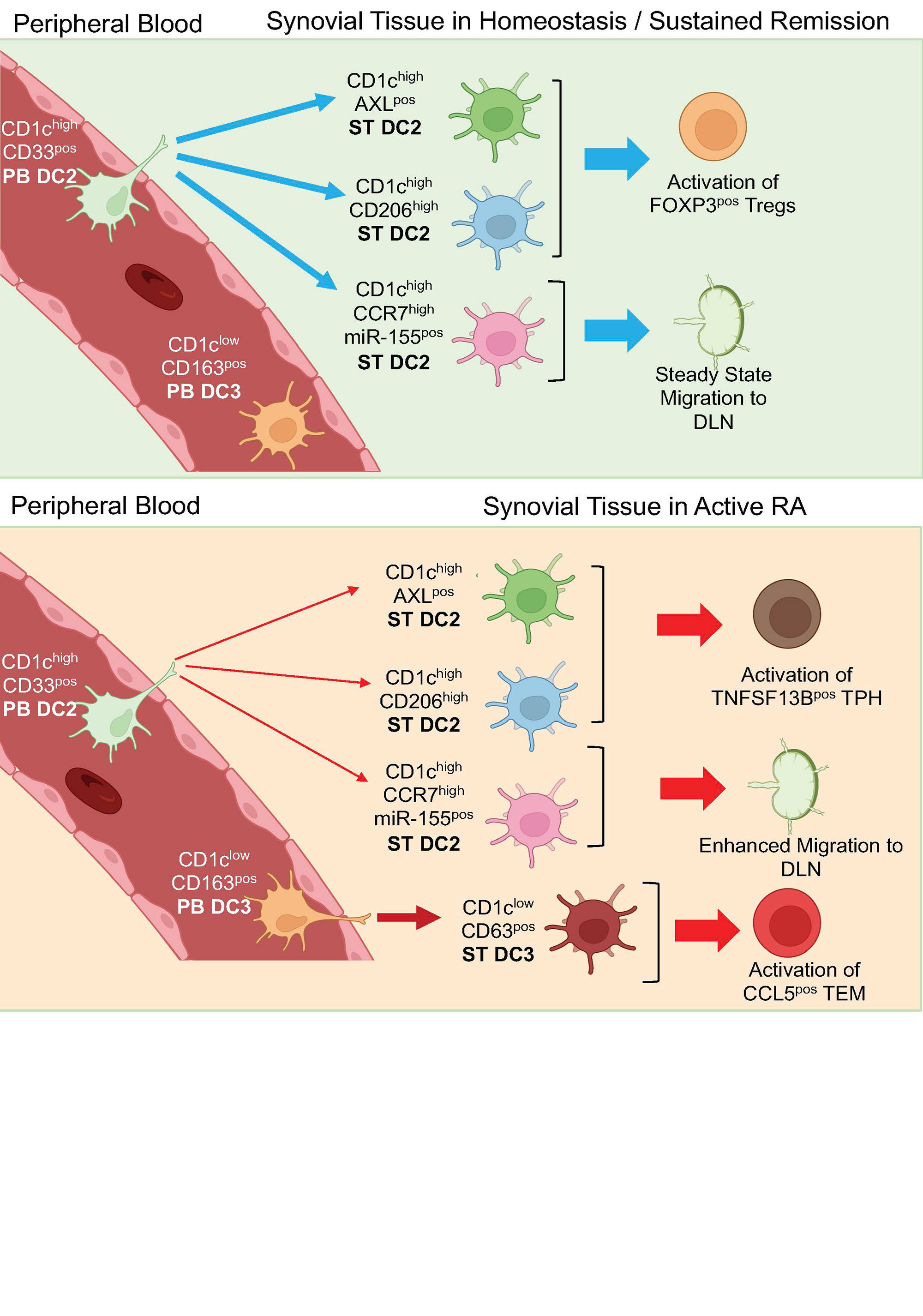Session Information
Date: Saturday, November 12, 2022
Title: Abstracts: Innate Immunity
Session Type: Abstract Session
Session Time: 5:00PM-6:00PM
Background/Purpose: Current treatments for RA do not restore the immune tolerance characteristic of health. Dendritic cells (DC) are one of the cell types that can reset adaptive immunity. Characterisation of synovial tissue (ST)-DCs in RA patients and heathy donors may reveal pathways that enable transition to cure.
Methods: ST-DCs from biopsies of remission RA, active RA and healthy synovium (SYNGem biobank1) were compared by scRNAseq, flow cytometry and synovial tissue imaging. Blood (PB) ST-DC precursors in remission (BioRRA biobank2) were evaluated by scRNAseq. Functions of sorted ST-DC clusters were tested by co-culture with autologous T-cells and in animal models.
Results: The most abundant DC population in all human synovial tissues are CD1cpos and scRNAseq uncovered that these are highly heterogenous, revealing 5 distinct clusters. They differ in transcriptomics, functions, distribution, location, and ontogeny between joint conditions. Trajectory analysis identified that the 3 ST-CD1chigh clusters: AXLpos, CD206pos and CCR7pos differentiate from blood CD1chigh DC2 precursors, whereas the ST-CD1clowCD63pos cluster differentiated from blood DC3 (CD1clowCD163pos) precursors. The CD1chighAXLpos and CD1chighCD206pos are the most abundant clusters in healthy synovial tissues, and are located in the superficial sublining layer. The active RA synovium is characterised by emergence in the sublining layer of DC3-precursor derived CD1clowCD63pos DCs. Their number decreases significantly in remission, which is characterised by a dominant CD1chighCD206pos and absence of CD1chighAXLpos clusters typical of the healthy synovium. Some remission RA patients however retained a substantial CD1clowCD63pos cluster characteristic of active RA suggesting this or their blood DC3 precursors may be predictive of flare. Consistent with that, in BioRRA remission cohort, the specific transcriptomic signature of PB DC3 precursors were predictive of disease flare. FACS-sorted ST-DC2/3 clusters in co-cultures with autologous CD4pos memory T-cells demonstrated their distinct functions within and between joint conditions. ST-DC2s from active RA supported proliferation/survival of T-peripheral helper cells (Tph) that drives autoantibody production, and ST-DC3s supported chemokine enriched CCL5pos T-effector memory cells. In contrast, ST-DC2s from remission supported FOXP3posTIGITpos regulatory T-cells, suggesting tolerogenic function. ST-DC3 clusters if present in remission activated Tph cells, suggesting an activatory function and a role in disease flare. Mouse lymph-duct canulation revealed that ST-CD1chighCCR7high cluster has a migratory phenotype, and their migratory function and activation is enhanced in active RA and regulated by miR-155.
Conclusion: Distinct synovial tissue DC CD1cpos clusters may determine healthy immune tolerance, autoimmunity and disease remission. Therapeutic targeting of the stimulatory/inflammatory functions of ST-DC3 (CD63pos) in remission, and/or re-instating the healthy ST-DC2: CD1chighAXLpos and CD1chighCD206pos clusters might provide pathways to transform remission into healthy immune-homeostasis.
Ref.1 Alivernini et al. 2020
Ref.2 Baker et al. 2019
To cite this abstract in AMA style:
Elmesmari A, MacDonald L, Frew J, Somma D, Di Mario C, Paoletti A, Vaughan D, Tolusso B, Perniola S, Gessi M, Lemgruber L, Gigante M, Petricca L, Bui L, Bruno D, McSharry c, Isaacs J, McInnes I, Milling S, Gremese E, Otto T, Baker K, Alivernini S, Kurowska-Stolarska M. Heterogeneity in Origin and Function of Distinct Human Synovial-tissue Dendritic Cells in Health, Active Rheumatoid Arthritis (RA) and RA in Disease Remission [abstract]. Arthritis Rheumatol. 2022; 74 (suppl 9). https://acrabstracts.org/abstract/heterogeneity-in-origin-and-function-of-distinct-human-synovial-tissue-dendritic-cells-in-health-active-rheumatoid-arthritis-ra-and-ra-in-disease-remission/. Accessed .« Back to ACR Convergence 2022
ACR Meeting Abstracts - https://acrabstracts.org/abstract/heterogeneity-in-origin-and-function-of-distinct-human-synovial-tissue-dendritic-cells-in-health-active-rheumatoid-arthritis-ra-and-ra-in-disease-remission/

